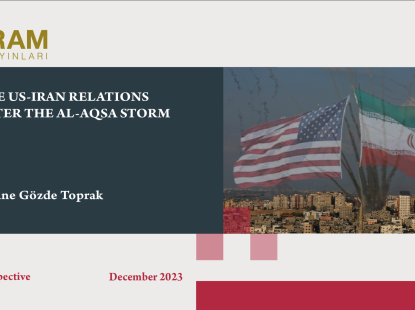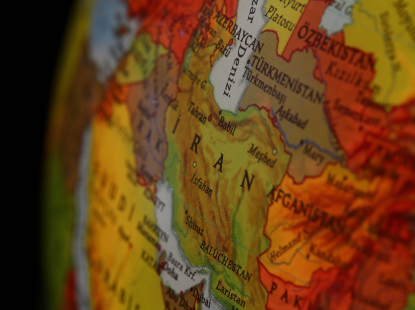Turkish-Iranian Relations Under Global and Regional Advances
Turkish-Iranian Relations Under Global and Regional Advances
Türkiye, under the Russian-Ukrainian War that sparked in February and occupied the international agenda, emphasized its position in NATO as commencing reconciliation efforts accordingly to its reputation in Russia and Ukraine. As the visible augmentation within Turkish-Western relations remains, the number of US committees visiting Türkiye is on a vital rise. Türkiye being prominent recently is not just rooted in its geopolitical positioning against Russia nor its applauded defense industry capacity. Also in the Middle Eastern region, the prompt easing process between Türkiye and UAE along with unfroze relationships Türkiye has with Saudi Arabia and Egypt draw the attention of various observers. Israeli President Herzog’s visit to Türkiye on March 9, the converging relationships the US Ambassador of Turkey Murat Mercan has developed with Israeli milieus in Washington, and the planned visit of both Turkish Foreign Affairs Minister and Defense Minister to Tel Aviv stands as an indicator to a grave reconciliation in Turkish-Israeli affairs. Türkiye’s looming to the countries in the region under the normalization policy is monitored tightly by the third parties as the Russian invasion.
Iran and the Regional Enhancements
Tehran with halted pressure after the Biden’s election in the US was highly confident about the Vienna Talks until quite recently hence simultaneous with the invasion a deadlock arose in the talks. As some observers argue that the deadlock is caused by Russia, the intensified tension allegedly instigated the IRGC remains listed as a terrorist organization by the US. The US proposed to halt the IRGC on the list while the Quds Force lingers, and the offer has been declined by Iran. The Biden Administration’s overlook of the uptick in Iranian oil export alleviates the market. The forthcoming agreement’s vanity on substituting Russian natural sources in the short term and the imminent Congress Election’s outcome and its possible impact on ongoing agreement steer parties to delay the talks.
Solely Israel and Saudi Arabia strongly observe the Nuclear Talks along with additional countries in the region. The two countries constituted firm relationships with Trump and prominently supported the administration’s Maximum Pressure policy including the assassination of Qassem Soleimani are concerned by the Biden Administration’s compromises. Nevertheless, the US government defends its policies by stating the Nuclear Talks were carried out to refrain Iran from its nuclear activities, and the worried countries in the region should take their initiation. The commenced talks in Baghdad by Saudi Arabia to investigate its relations with Iran in advance could not attain any remarkable progress after nearly a year. Particularly, if the Yemeni Civil War remains unsettled, any improvement in the relations is not expected. Since 2015, the Riyad government did not receive any concrete victory against the Iran-backed Ansarullah, and the utmost significant strategic facilities including ARAMCO are facing mounting Houthi missile and drone attacks. After the end of the UN-backed April-dated ceasefire would not finalize with a permanent agreement, it is expected to conflict to deepen further.
Following a possible Nuclear Deal, the countries’ take on Iranian regional policies to become beyond aggressive exists not limited merely to Israel and Saudi Arabia. UAE was also exposed to Iranian-backed groups’ attacks through Iraq and Yemen. The Abu Dhabi government that sent the National Security Advisor Tahnoun bin Zayed al Nahyan to Tehran on December 6 to ease the tension through negotiations did not receive the requested response as the Iranian backlash on the ratified Abraham Accords between UAE and Israel. Both the ceasefire in Yemen and the Vienna Talks’ current state will impact Iran-UAE affairs. Besides, Afghanistan’s economic and environmental conditions under the Taliban governance, a steep increase in the Afghan immigrants headed Iran stands. In April, the mistreated Afghan visuals spread on social media pushed Kabul to summon Iran Ambassador and condemn the incidents. As some Taliban commanders threatened Iran to initiate an assault, the attacks on representations in Kabul and Herat were carried out. The dispute to be enhanced shortly, the Afghan population to steer to Türkiye is highly estimated. Finally, Iran carries concerns about the political changeover in Pakistan spreading to its homeland.
New Era Türkiye-Iran Affairs
Türkiye and Iran remain disputed parties, particularly in Syria, Iraq, and Azerbaijan. Last ten years, Türkiye, under the mere pressure of US and Western countries and referred to as a so-called ally, embraced a moderation policy on its clashes with Russia and Iran, concreted with Astana Summits. Those disagreements are also rooted back in the formed relationships in the region after the coup d’état in Egypt and disputes with Israel along with its distorted affairs with the Western allies. Consequently, Ankara has been taken cautious steps in Syria and Iraq as being conscious of its left-out position in the region and affirmed Moscow and Tehran’s redlines. The immense Russian-Ukrainian War that commenced in February grows further messy for Russia, and with the Bosporus stand disabled, Russia’s military impact on Syria is expected to be lowered. Moscow left certain grounds in Syria to pro-Iran groups is alleged, and the emptied presence in the field for Iran to fill could lead Israel to intensify its operations in Syria. The situation is set as equivalent for Turkish operations too. Ankara will augment its pressure on Russia to compromise without jeopardizing its fragile conduct with Moscow. The compromises could both be carried out on the Syrian regime’s Geneva Peace Talks with opposition or military operations on the field. The enhanced cross-border operations in Northern Syria steer Turkey to confront Iran-backed groups.
Iran resolutely monitors Türkiye’s recent diplomatic dynamism. Particularly since the Nagorno-Karabakh War, as the anti-Türkiye discourse grew, the rapprochement with Israel, lending Khashoggi Case’s files to Saudi Arabia legitimized by the officials. Moreover, bizarre statements were made such as the cause of dust storms which come off from Africa burdened on Türkiye’s construction of the allegedly Israeli-backed Turkish GAP Project, even by the figures as the former President Khatami’s Vice Masoumeh Ebtekar. In the Iranian press, an Afghan refugee’s knife attack on Shiite clerics affiliated with Türkiye was attributable to the aggressor’s Uzbek ethnicity. State-controlled Iranian press reviewed the Erbil missile attack as a message to Türkiye and engraved various allegations including the conducted attack penetrated Turkish officials. Again, President Erdogan’s procrastinated visit to Tehran was viewed under the anti-Iran regional conspiracies. To round up, Iran disturbed with Turkish immense regional diplomacy utilizes every irrelevant subject to operate against Türkiye.
From Türkiye’s take, Iran’s legitimate nuclear or regional interests have been fortified even under internal and external pressures implemented. Hence, Tehran’s maximalist hardline approach in Iraq and Syria along with its threatening statements during and after the Nagorno-Karabagh War, and forth-revived PKK junctures show Iranian question now gradually grow into national security, both for Türkiye and its allies. Ankara views the imminent Nuclear Deal as an apparatus for Iran to bolster its presence in Iraq and Syria, as it utilized Obama-era JCPOA to conduct its expansionist drives. Consequently, Türkiye utilized its balancing impact in favor of Iran in the Maximum Pressure policy era, may facilitate that influence to contain Iran’s adventurism under the new conditions.











